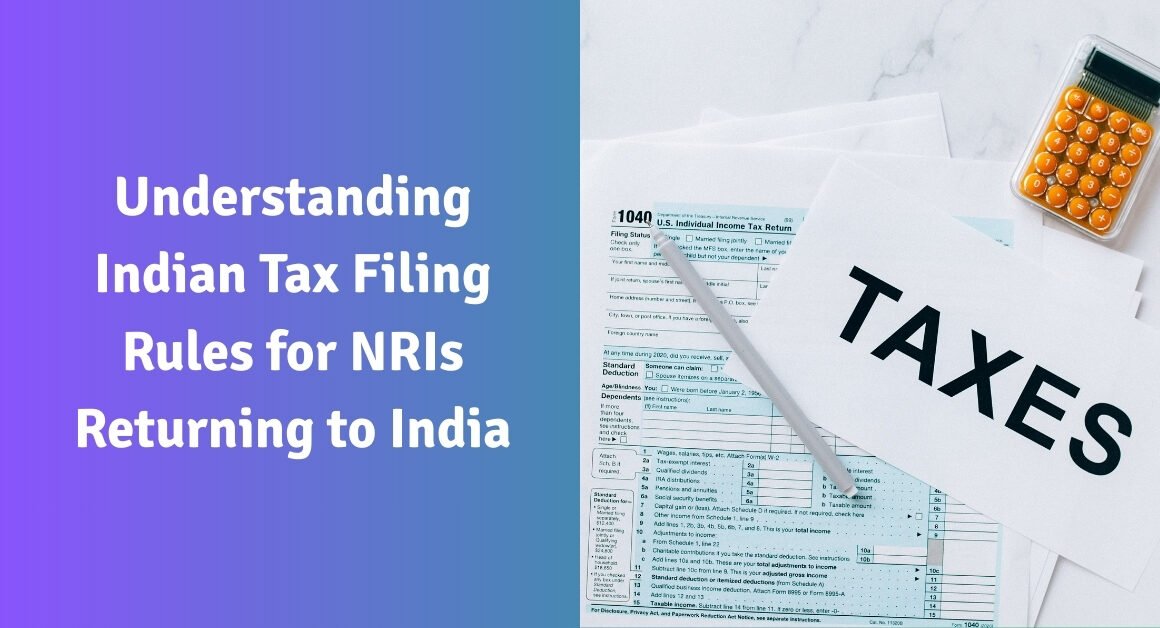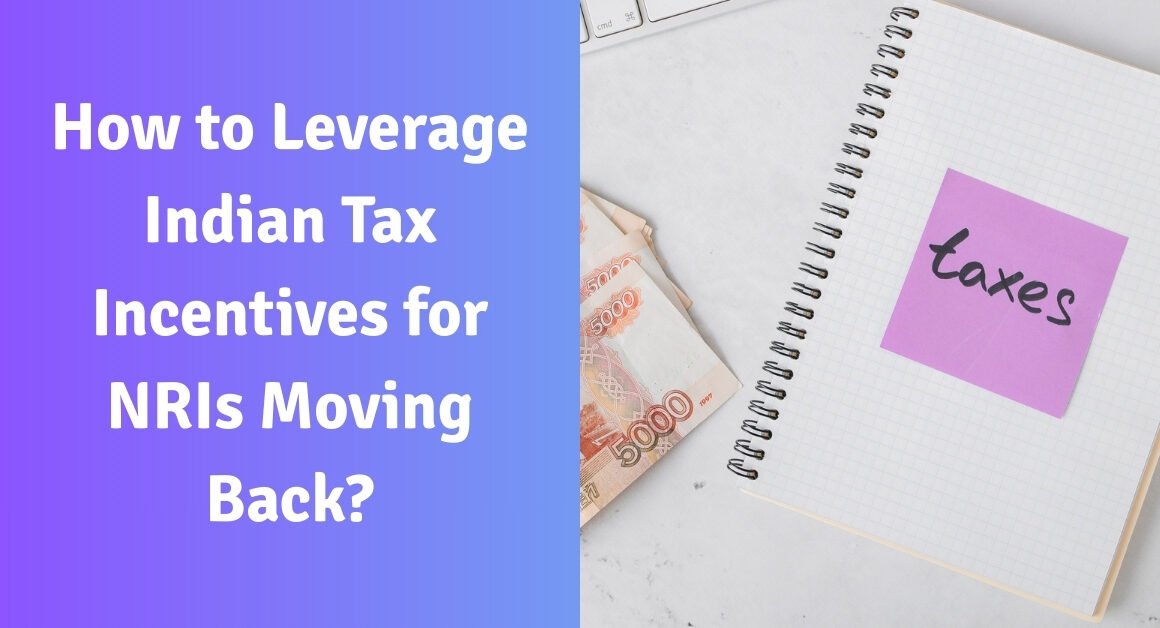Coming back to India after staying overseas has many monetary implications, primarily tax-related. Being a returning NRI, knowing the tax benefits you can avail yourself of can make a big difference to your financial situation. India provides various tax benefits exclusively for returning residents that can assist you in maximizing your finances and creating wealth effectively. With the Indian economy set to continue its growth and with good tax regimes for Indians returning, now is the time to take advantage of these incentives. Here’s how you can take advantage of Indian tax benefits when you return.
Understand RNOR Status Benefits
Once you go back to India, you can be eligible for the Resident but Not Ordinarily Resident (RNOR) category for a period of maximum two financial years. It is a transitional category with major tax benefits since your foreign income is still exempted from Indian taxation. You can be an RNOR if you have been out of India as a non-resident for 9 out of the last 10 financial years, or been in India for less than 729 days for the last 7 financial years. Why. Because while in your RNOR years, you tax only that income earned or accrued. in India and your worldwide income remains tax-exempt. It provides you with a golden opportunity to reorganize your investments and strategize your finances before fully becoming taxable as an Indian resident.
Leverage Section 80C Deductions
Once you are a resident of India, familiarize yourself with Section 80C of the Income Tax Act which allows deductions worth ₹1.5 lakh from your income that is taxable. Section 80C has allowance for investment in tax-saving programs like Equity Linked Savings Schemes (ELSS), Public Provident Fund (PPF), National Pension System (NPS), and premium of life insurance. These investment schemes not just help decrease your tax liability but also support your goals of long-term wealth generation. For instance, ELSS mutual funds have a three-year lock-in – the lowest of all 80C investments – and yet offer the potential to earn higher returns through equity exposure.
Optimize Housing Loan Benefits
If you are purchasing a property in India, tax relief on home loans can be enormous. You can claim a deduction of up to ₹2 lakh for interest paid on self-occupied property under Section 24(b), and repayment of principal is deductible under Section 80C (under the overall limit of ₹1.5 lakh). Also, if you buy a property that costs less than ₹45 lakh, you may be eligible for one more interest deduction of ₹1.5 lakh under Section 80EEA. This really gives you combined interest deductions of up to ₹3.5 lakh per year – a massive tax advantage that can make it easier to afford owning a house while building valuable assets.
Utilize Healthcare and Insurance Benefits
Tax benefits on healthcare cannot be ignored, especially when you are coming back with family. Section 80D allows reimbursement of medical insurance premium costs – ₹25,000 for self and family, and a further ₹25,000 for parents (₹50,000 in case of senior citizen parents). Furthermore, Section 80DD provides deductions of up to ₹75,000 for medical treatment of dependents with disabilities. These too are substantial in reducing your tax liability while ensuring that your family’s healthcare is well attended to upon your return to India.
Explore NPS and Other Retirement Options
The National Pension System (NPS) offers excellent tax advantages to NRI returnees who want to plan their retirement in India. In addition to the ₹1.5 lakh deduction under Section 80C, an additional deduction of ₹50,000 is available under Section 80CCD(1B). Employer contribution to NPS is also permitted as a deduction to 10% of your salary. NPS investments grow tax-free, and on maturity, 60% of the corpus can be withdrawn tax-free. The remaining 40% must be used to purchase an annuity, which gives a steady income during retirement. This triple tax advantage (investment deduction, tax-free growth, and partial tax-free withdrawal) makes NPS an attractive option for long-term financial planning.
Conclusion
As a return NRI, you need to plan and act to optimize your Indian tax advantage. You can accumulate wealth in India by making the most of your RNOR status and optimizing your deductions under the Income Tax Act. Plan ahead before returning and implement it when you arrive. Keep yourself updated with the tax laws and consult a tax expert who is well-versed in NRI taxes. Start your new life in India on a strong financial footing by taking the right decision regarding your tax status.
FAQs
1. How long can I maintain RNOR status after returning to India?
Ans – Typically up to 2 financial years, depending on your previous residency history.
2. Are my foreign investments taxable immediately upon return to India?
Ans – Not if you qualify as RNOR; foreign income remains tax-exempt during this period.
3. Can I claim housing loan benefits if I purchase property within my first year of return?
Ans – Yes, housing loan tax benefits are available regardless of how long you’ve been in India.
4. Do I need to declare my foreign assets even during RNOR status?
Ans – Yes, disclosure is mandatory in Schedule FA of your income tax return, even if not taxable.
5. Can I continue investing in my foreign retirement accounts as a resident Indian?
Ans – Yes, but these may be taxable in India once you become an Ordinary Resident.
6. Are dividends from Indian investments taxed differently for returning NRIs?
Ans – No, dividend taxation is the same for all resident Indians, including returning NRIs.
7. Can I claim tax benefits for both parents’ and in-laws’ medical insurance?
Ans – Yes, deductions for parents and in-laws can be claimed separately under specific conditions.
8. Is income from foreign rental property taxable in India?
Ans – Not during RNOR status, but yes once you become an Ordinary Resident.
9. Can I claim tax benefits on international health insurance policies?
Ans – Only if the policy is issued by an Indian insurance company.
10. Are capital gains from foreign investments made before returning taxable in India?
Ans – Not during RNOR status, but may be taxable once you become an Ordinary Resident.
Disclaimer: The information provided here is for educational and informational purposes only and should not be construed as financial, legal, or tax advice. Consult with a qualified professional before making any investment decisions. We do not accept any liability for errors or omissions in this information nor any direct, indirect, or consequential losses arising from its use.





